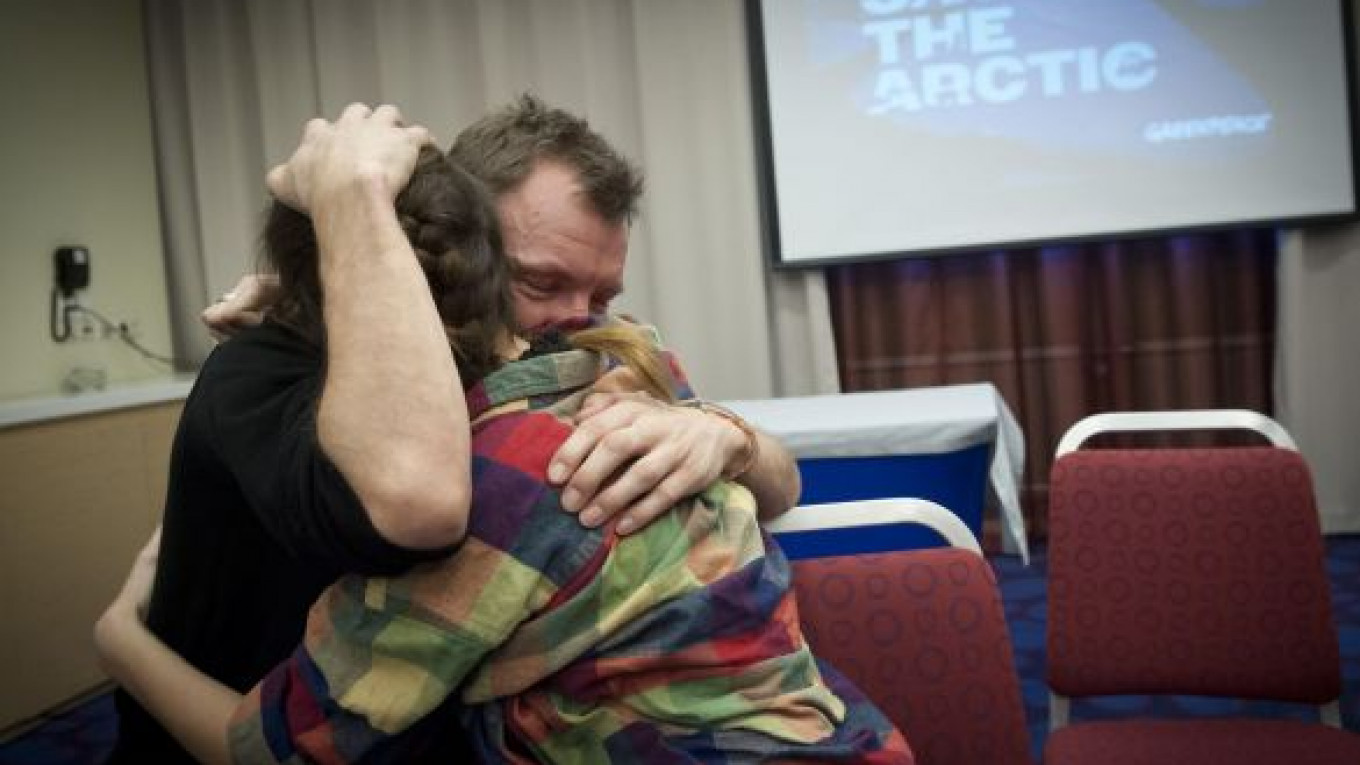A Moscow court on Thursday released on amnesty four defendants in the so-called Bolotnoye case, while people targeted in other high-profile criminal cases, including the Greenpeace "Arctic 30" and two members of punk band Pussy Riot, were still awaiting the enforcement of the Kremlin amnesty passed Wednesday.
The Zamoskvoretsky District Court on Thursday dropped the charges of taking part in "riots" on Bolotnaya Ploshchad in May 2012 faced by four of the 12 defendants at the request of their lawyers, who urged the court to implement the amnesty, Interfax reported. The prosecutor supported the defense's pleas.
Two of the amnestied defendants — Vladimir Akimenkov and Leonid Kovyazin, both of whom had spent numerous months in detention — were released in the courtroom. Another defendant, Nikolai Kavkazsky, had his house arrest cancelled, and another, Maria Baronova, had her travel restrictions lifted.
Akimenkov and Kovyazin said by phone from the court that their joy from the release was mitigated by the fact that their friends remained on trial, with some of them still in detention.
"I had expected that either all of us or no one would be released," Akimenkov said. "But the authorities acted derisively by releasing [only] part of us," he said, adding that he would urge political and civil activists to stage a large-scale rally "for a broad amnesty of political prisoners."
Kovyazin echoed Akimenkov, saying the Kremlin amnesty "can be called large only with big sarcasm," he said.
Baronova and Kavkazsky's lawyer Vadim Klyuvgant were not available on their cell phones late Thursday afternoon, as they were attending the trial of the remaining eight defendants.
Eight of the 12 defendants do not meet the amnesty requirements, as they are also charged with physically attacking police at the Bolotnaya rally, and the trial against them continued Thursday. They face up to eight years in prison for assaulting police and taking part in "riots."
Nor will the amnesty apply to two of the rally organizers — Left Front leader Sergei Udaltsov and senior Left Front member Leonid Razvozzhayev — who are awaiting trial on charges of "staging riots" on Bolotnaya.
President Vladimir Putin, at his annual news conference Thursday, justified excluding from the amnesty suspected organizers of riots and suspected attackers of police officers, saying the "duty of authorities" was to "not allow anyone to break the law so outrageously."
Some other perceived "political prisoners" formally fall under the amnesty's requirements and their supporters are hoping for their prompt release. These include 28 Greenpeace activists and two journalists detained over a protest in the Arctic in September and two Pussy Riot musicians, Nadezhda Tolokonnikova and Maria Alyokhina, imprisoned for two years over a February 2012 anti-government performance at a Moscow cathedral.
Putin said he believed the amnesty would apply to the so-called Greenpeace "Arctic 30," who face up to seven years in prison on hooliganism charges after a group of them attempted to scale a Gazprom offshore rig in the Arctic.
But Putin said he hoped that the Arctic 30's detention would "serve as a lesson" to them and set up Greenpeace and Russia "for joint positive work."
No one was available at Greenpeace's Moscow press office late Thursday afternoon to comment on the possible timeline for the activists and journalists, who are currently out on bail, to be amnestied.
Putin did not share his thoughts about the expected release of the Pussy Riot rockers but said he was "sorry for them, not because they found themselves in prison" but because they "started a disgrace" that "dishonors women."
Irina Khrunova, a lawyer for Tolokonnikova and Alyokhina, who are serving time in the Krasnoyarsk and Nizhny Novgorod regions, respectively, told Interfax that the pair will be released as soon as prison officials prepare the required documents.
According to instructions issued by the State Duma on Thursday, part of which was reposted by the Federal Prison Service, the authority to pardon suspects in crimes, like the Greenpeace activists, belongs to investigators, while the power to pardon convicts, like the Pussy Riot musicians, belongs to prison officials.
Contact the author at [email protected]
A Message from The Moscow Times:
Dear readers,
We are facing unprecedented challenges. Russia's Prosecutor General's Office has designated The Moscow Times as an "undesirable" organization, criminalizing our work and putting our staff at risk of prosecution. This follows our earlier unjust labeling as a "foreign agent."
These actions are direct attempts to silence independent journalism in Russia. The authorities claim our work "discredits the decisions of the Russian leadership." We see things differently: we strive to provide accurate, unbiased reporting on Russia.
We, the journalists of The Moscow Times, refuse to be silenced. But to continue our work, we need your help.
Your support, no matter how small, makes a world of difference. If you can, please support us monthly starting from just $2. It's quick to set up, and every contribution makes a significant impact.
By supporting The Moscow Times, you're defending open, independent journalism in the face of repression. Thank you for standing with us.
Remind me later.






